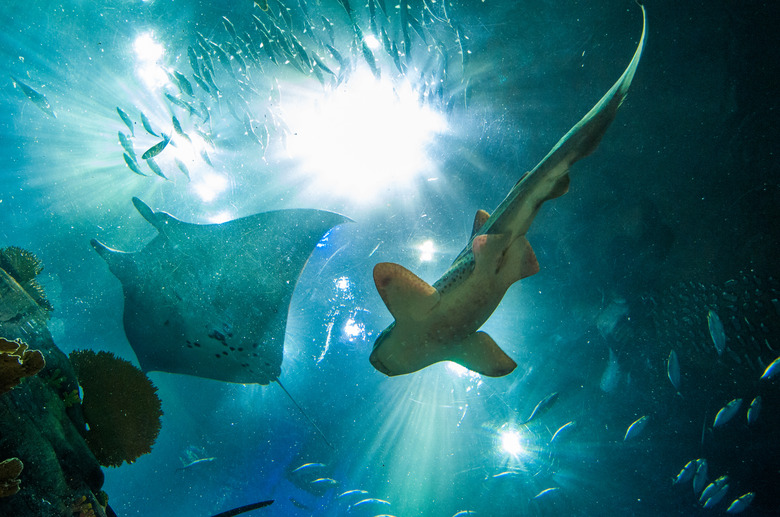What Type Of Animals Do Marine Biologists Study?
As you might have guessed, marine biologists study ocean organisms. The oceans, however, contain an estimated million or more species. Nobody is going to be able to study all of them, even at the shallowest level. As with most scientists, marine biologists specialize. The animals and other organisms a marine biologist may choose to study range from the gigantic, such as the great whales, to the inconspicuous, such as a species of plankton.
Algae -- Phycology
Algae — Phycology
The study of marine algae is not nearly as dull as it might first appear. Algae aren't plants, but some of them look like plants. In the oceans, all those seaweeds are algae. While kelp forests form a bizarre habitat, some of the most important algae are far smaller. Phytoplankton — free-floating algae — form the basis of most ocean food webs. Most fish and marine mammals depend ultimately on phytoplankton. Moreover, they also produce much of the world's oxygen. On the downside, algal blooms cause ocean dead zones, killing fish and rendering vast swathes of ocean inimical to most life.
Fish -- Ichthyology
Fish — Ichthyology
The study of fish has obvious practical applications since we eat them. Avoiding the over-exploitation of ocean fish stocks requires the input of marine biologists, specifically ichthyologists, although whether politicians will pay any attention to their advice is another matter entirely. Other fish, such as sharks, should be studied to assist with conservation efforts. A great deal is still not known about even the most common species.
Invertebrates -- Invertebrate Zoology
Invertebrates — Invertebrate Zoology
Studying marine invertebrates — animals without backbones — doesn't necessarily mean counting barnacles all day. Invertebrate zoology is an enormous field, covering marine creatures ranging from giant squid to mussels. It includes important food species, such as lobsters and crabs, ecologically vital animals, such as reef-building corals, pests, such as crown-of-thorn starfish in the wrong place, and extremely elusive animals, such as the deep-dwelling vampire squid. Some marine invertebrates are highly intelligent; for example, octopi are known to use tools. Other invertebrates, such as the ornate and vividly colored sea slugs, are extraordinarily beautiful.
Mammals -- Mammalian Zoology
Mammals — Mammalian Zoology
The study of marine mammals might seem the most immediately appealing specialty, and there's plenty of room for more study. Huge gaps exist in our knowledge of whales, seals, dolphins and dugongs, despite their size. Scientists are still not entirely sure what narwhals do with their tusks. Aside from intrinsic interest, marine biologists may study these animals in order to find ways to protect them or to determine their impact on fisheries. For example, it was recently discovered that whales and possibly even seals may actually support fish populations by bringing nutrient-rich water to the surface.
Cite This Article
MLA
Willson, Judith. "What Type Of Animals Do Marine Biologists Study?" sciencing.com, https://www.sciencing.com/type-animals-marine-biologists-study-13220/. 22 November 2019.
APA
Willson, Judith. (2019, November 22). What Type Of Animals Do Marine Biologists Study?. sciencing.com. Retrieved from https://www.sciencing.com/type-animals-marine-biologists-study-13220/
Chicago
Willson, Judith. What Type Of Animals Do Marine Biologists Study? last modified March 24, 2022. https://www.sciencing.com/type-animals-marine-biologists-study-13220/
